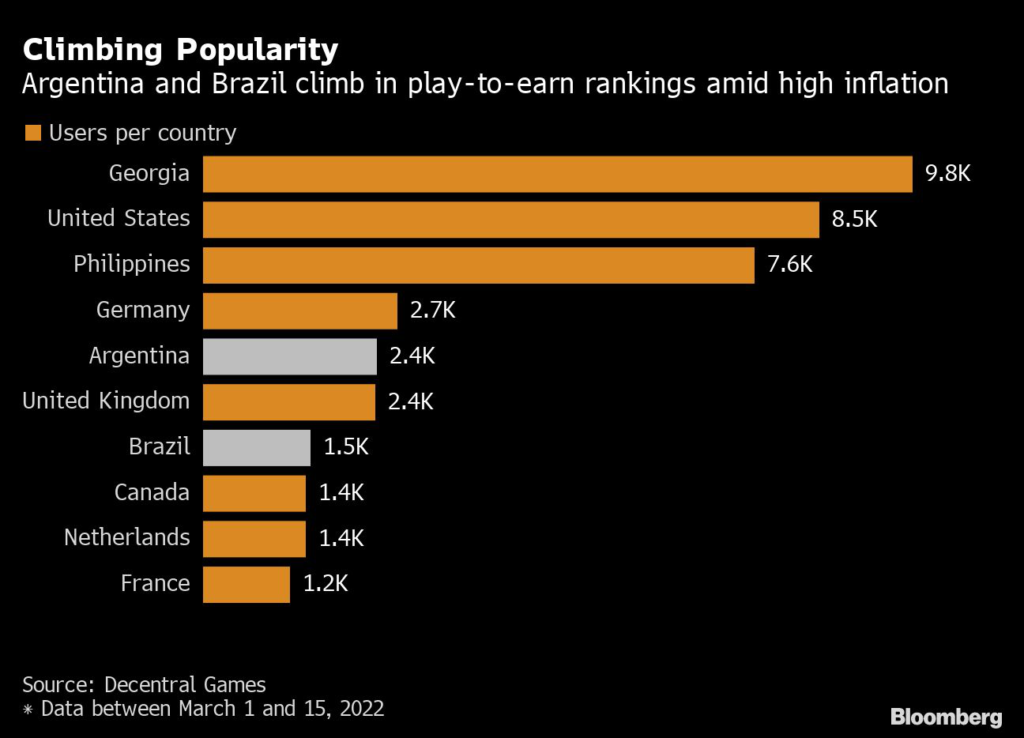(Bloomberg) — Argentina has become the top place in Latin America for “play-to-earn” crypto games, as inflation running at a ten-month high erodes the value of local salaries.
South America’s second-largest economy jumped in the rankings and is also the fifth around the world when it comes to playing games for income, with 9,400 visits so far this year to Decentral Games, the metaverse company with the most players in the world, up from just a few hundred last year.
Brazil also shot up in the platform to become the seventh-most popular place for these games.
Both countries are grappling with double-digit inflation, trailing only Venezuela in Latin America.
In Argentina, prices are growing at a pace above 50% annually and wages have grown below inflation for the last four years. In Brazil, inflation doubled in the last year to above 10% annually.
“Argentina and Brazil’s trends show the numbers will keep rising,” said Gabriel Mellace, Decentral Games head of investor relations.
“Young people are not only looking for profitability. They’re also looking for fun.”
Read More: Play-to-Earn Crypto Gaming Apps Surpass DeFi in User Popularity
Within Latin America, Argentina, Brazil and Venezuela are the countries with the most users in Axie Infinity, a platform where players earn tokens by winning battles that’s been credited with kicking off a gaming craze.
Latin Americans usually participate through a type of account in which they play on behalf of Americans because they cannot afford opening their own accounts, according to Mauricio Ramos, Axie’s head of Latin America.
Because several gaming platforms, including Decentral Games, Axie Infinity and Sandbox require users to have an NFT to play, users typically buy “NFT delegations,” which are NFT rentals.
In Decentral Games, for example, users need to have an NFT worth $5,200 to play, which is too expensive for Argentines and Brazilians to buy themselves, Mellace said. Instead, they play on behalf of Americans and Germans.
Read More: Crypto Poker Is What Everyone Is Doing in the Metaverse
That’s the case of Franco Villaflor, a 28-year-old DJ, for whom playing poker in the metaverse on behalf of an American man for three hours a day has allowed him to make as much as $1,500 a month, the equivalent to what he makes as a DJ.
That’s after giving 40% of the proceeds to the owner of the NFT.
To be sure, the popularity of pay-to-earn games in emerging markets isn’t new. Growth in Axie Infinity is fastest in Asia, says Yat Siu, founder of Animoca Brands, which owns Sandbox.
Still, Latin America has climbed to represent 25% of users globally, and is now the second-fastest growth area, he added.
For Argentines, there’s an added benefit of making money through these games.
The money is paid via crypto assets in accounts abroad, allowing them to circumvent capital controls and control how much they bring into the country.
Javier Espeche makes six times more money by playing poker three hours a day in the metaverse on behalf of an American man than from his job working as a pet furniture maker.
“My mother doesn’t understand how I can spend my time playing games instead of doing something fruitful,” Espeche, 34, said.
“But what’s the point of working hard if I can earn more like this?”
More stories like this are available on bloomberg.com
©2022 Bloomberg L.P.











